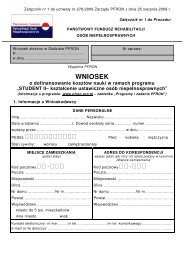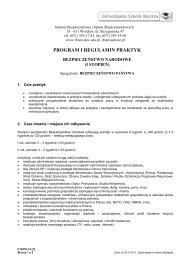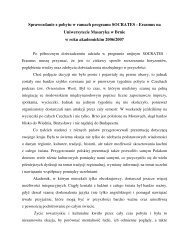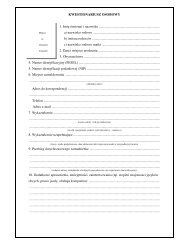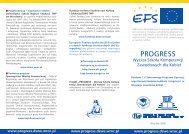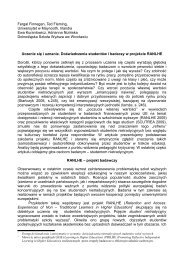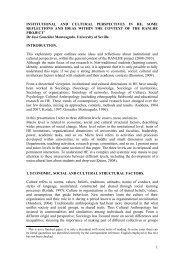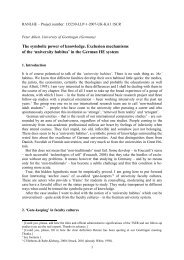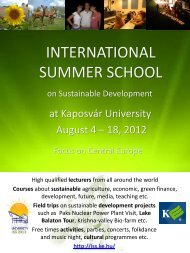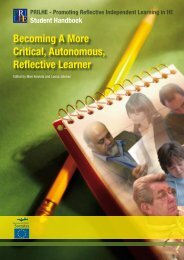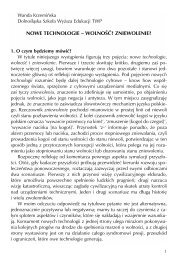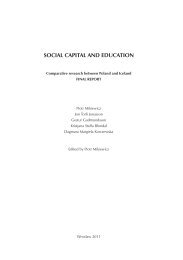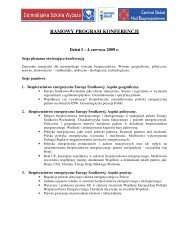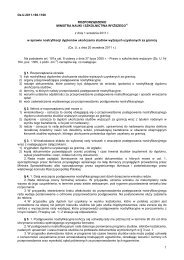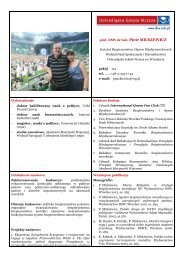Becoming A More Critical, Autonomous, Reflective Learner
Becoming A More Critical, Autonomous, Reflective Learner
Becoming A More Critical, Autonomous, Reflective Learner
You also want an ePaper? Increase the reach of your titles
YUMPU automatically turns print PDFs into web optimized ePapers that Google loves.
PRILHE Project - Lecturer’s Toolkit<br />
3.5 Group Work<br />
Perhaps the most clear-cut finding from the PRILHE, Promoting <strong>Reflective</strong> Independent Learning in Higher Education, project<br />
research (and the prior LIHE, Learning in Higher Education project) was the preferences of non traditional mature students for<br />
learning in groups and through dialogue.<br />
Before I used to study in a very individual way……and now since I’ve started studying sociology, I’ve seen that<br />
working in a group has lots of benefits. When I think about the group as a whole I can see that working together has<br />
helped them and me on every level<br />
(Student, Spain)<br />
I don’t know if I would have managed that if I had learned alone. So we organized a small learning group and calculated<br />
written tests (subject accounting). And I’ve profited a lot from others who were better informed. For example, I didn’t<br />
know that it’s possible to borrow old written tests.<br />
(Student, Germany)<br />
The way the lecturer conducted his classes forced me almost to get out of my hiding. Right up to the moment of<br />
starting my studies I had been a very shy and quiet person, who couldn’t express her own opinion. Thanks to exercises<br />
which we do in groups and the discussions we have, I can now say aloud what I think, I don’t care what others think<br />
about me, I do what, according to me, is good for me and if someone appreciates my actions I have extra satisfaction<br />
that I do mean something in other people’s lives<br />
(Student, Poland)<br />
Group work is closely connected with the processes of building the group or more widely with group dynamics. This is a natural<br />
development of group processes: interaction, bonds, common aims, group homogeneity/heterogeneity, the structure, leadership,<br />
roles etc., which reinforce and support the learning of group members. There is no doubt that the experience, knowledge and skills<br />
of members are enriched through belonging to a group. The effectiveness of group work depends on different factors such as<br />
group composition, size and cohesion (Zander 1982). These factors can also support the promotion of critical, autonomous and<br />
reflective learning in higher education, taking into account both the organisation of education and its content.<br />
Importantly, the use of group discussion in university education allows us to change the „location” of knowledge in university<br />
circles. Knowledge belongs not only to teachers, lecturers or the writers of scientific publications, but also to students. It is created<br />
in the process of group discussion. The addressees of this new (created) knowledge are both teachers and students and this<br />
knowledge has the potential to challenge pre-understandings and presumptions both for teachers and students.<br />
…. in this dialogue, discourse, the students will be seeking their own possibilities, they will acquire courage, the<br />
courage to admit that they know a lot, that they can do a lot with it and that they have these visions which they create,<br />
which they can create. (…) but, despite this, they come and, every now and then, I hear questions of what it should<br />
be like and now, by the means of these discussions, I wanted to free them from this duty, from the correctness which<br />
they always want to interpret, „what I really mean”<br />
(Lecturer, Poland)<br />
28<br />
<strong>Becoming</strong> A <strong>More</strong> <strong>Critical</strong>, <strong>Autonomous</strong>, <strong>Reflective</strong> <strong>Learner</strong>



